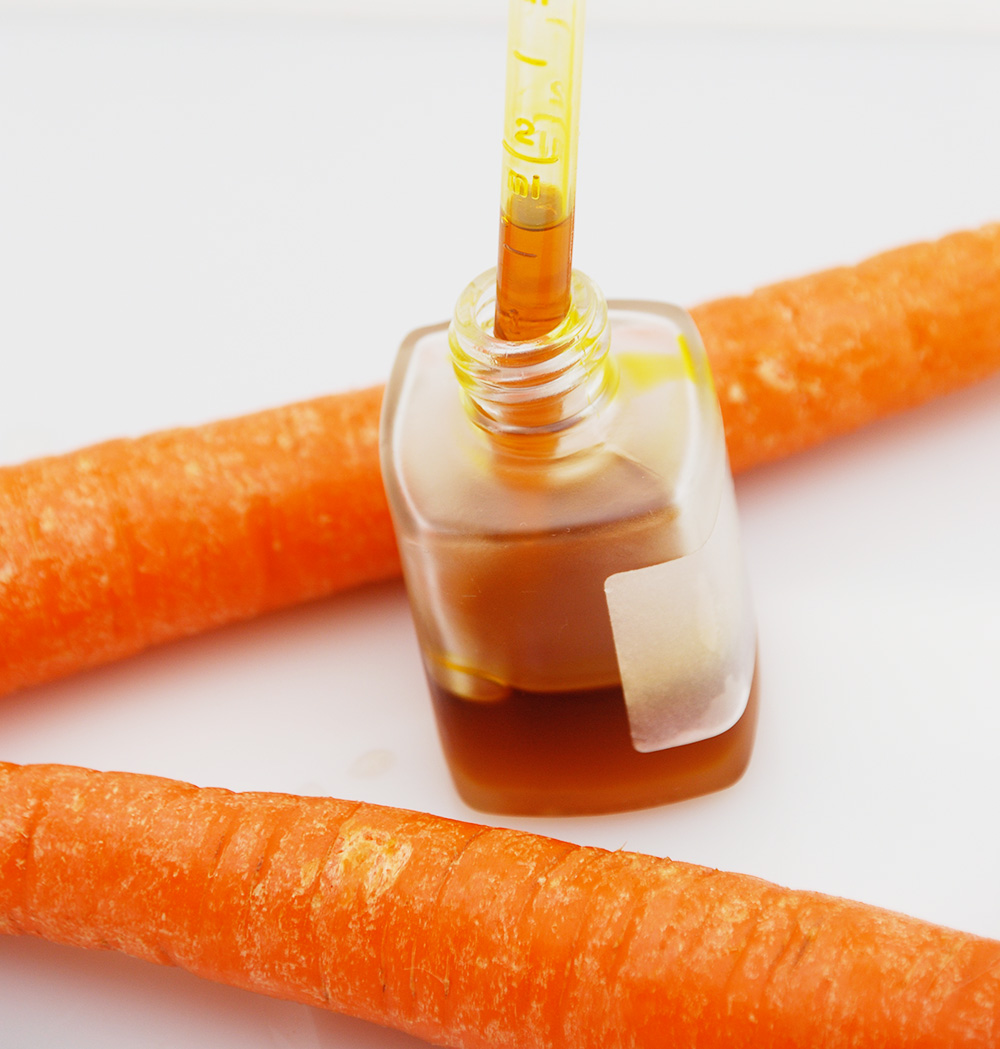There are many types of Vitamin A, and they all work differently. Retinol, retinoic acid, and carotenoids can all contribute to skin health. Your skin has receptors that can put vitamin A compounds to work giving your skin a vibrant, healthy appearance.
- Carotenoids are natural vitamin A compounds that include lycopene, beta-carotene, lutein, zeaxanthin, and astaxanthin
- Beta-carotene is provitamin A, the strongest plant-based vitamin A
- Beta-carotene has an orange pigment and is an antioxidant that protects skin
- Rosehip oil is a unique plant source of trans-retinoic acid, also sold commercially in a synthetic form as Tretinoin
- Synthetic retinoic acid helps with collagen production, but can also irritate skin
- Sources of natural, plant-based carotenoids are Rosehip oil, Sea-Buckthorn Berry Oil, Carrots, Cantaloupe, Pumpkin and more

There are numerous compounds that the human body can convert into true vitamin A within the body for use. Beta-carotene and other carotenoids are found in plants and give the orange color to various types of produce.
Many people know vitamin A for skin as Tretinoin, which is all-trans-retinoic acid. It is widely touted for anti-aging benefits but synthetic, concentrated Tretinoin has significant drawbacks including a high incidence of skin irritation, dryness, peeling, sun sensitivity, and hazards during pregnancy.
The only known plant source of trans-retinoic acid is rosehip oil. It can be used for skin regeneration, softening of scars, and anti-aging benefits without the hazards of synthetic Tretinoin because it is well complexed with essential fatty acids and delivers slowly to the skin. Rosehip also contains beta-carotene making it a broad source of several types of vitamin A.
Pure rosehip oil is only stable for a short period of time and should be used within 6 to 9 months or else will be ineffective. Look for a rosehip oil with deep orange color to ensure potency. If it is clear or light yellow the Vitamin A has degraded.
Retinol is the alcohol form of retinoic acid, and is less potent and less irritating. Retinol in skincare is generally manufactured in laboratories and is entirely synthetic. Synthetic retinol appears in many over-the-counter moisturizers, serums, and skin treatments. Your body has to do some work to convert it into retinoic acid to make it useful.
Retinol can also be transferred from mother to child during pregnancy and nursing, and use of synthetic Vitamin A skincare should be discontinued during pregnancy and nursing.
Synthetic Vitamin A may be easy to spot in over-the-counter skincare as it will stand out in the ingredients list as retinol, retinyl palmitate (an ester form), or the least potent form, retinaldehyde.
If you want natural, plant-based Vitamin A you'll need to know the plants that carry carotenoids. Instead of seeing Vitamin A called out as an individual ingredient you'll be getting it from including plants that are rich in beta-carotene like sea buckthorn berry oil, helio-carrot extract and other orange vegetables and fruits, and herbs like seaweeds, calendula, plantain, dandelion root, alfalfa leaf, acerola cherry, and camu camu.
Beta-carotene has antioxidant properties, evens skin tone, and can assist with long term sun damage protection. There is also some evidence that enzymes used by skin cells can create retinyl esters from topical beta-carotene, so you can likely get a gentle, low level amount of retinol in your skin just by using beta-carotene. The results may be slower than synthetic retinol, but for people with sensitive skin or who may be pregnant or nursing it can be a great choice.
Beta-carotene is oil soluble, so you'll need some healthy oils in your skincare to carry this valuable nutrient.
Which version of Vitamin A will you use?
Disclaimer: The information contained on this site is general in nature and for informational purposes. It is not meant to substitute for the advice provided by your own physician or other medical professional. None of the statements on this site are a recommendation as to how to treat any particular disease or health-related condition. If you suspect you have a disease or health-related condition of any kind, you should contact your health care professional immediately. Please read all product packaging carefully and consult with a healthcare professional before starting any diet, exercise, supplementation or medication program. Cosmetic products have not been evaluated by the Food and Drug Administration and are not intended to diagnose, treat, cure, or prevent disease.


